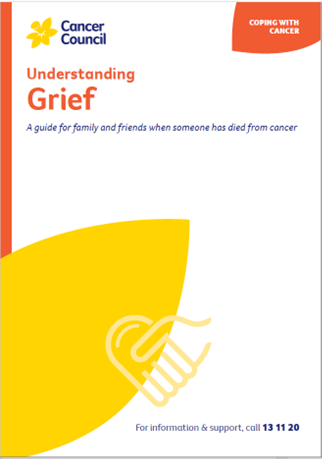- Home
- About Cancer
- Advanced cancer
- Understanding grief
- How to help someone who is grieving
How to help someone who is grieving
It can be hard to know how to help someone who is grieving. If you need to support grieving children, it may help to know they often react to death in a different way to adults.
Learn more about:
- What if I say the wrong thing?
- How can I ease their pain?
- When to suggest professional help
- Ways to help someone with grief
- Helping children deal with grief

You may become lost for words or feel hesitant about offering practical assistance. Simply making the offer can let the person know they are not alone.
What if I say the wrong thing?
It’s common to worry about saying or doing the wrong thing to someone who is grieving. It’s okay to be honest and say, “I want to help, but I’m not sure what to do” or “I don’t know what to say, but I want you to know I care. Please let me know when I get it wrong.” Most grieving people say that it’s worse when others say nothing at all.
It may not be as helpful to say, “I know how you feel.” Each person grieves in their own way. Your experiences may give you a better understanding of the person’s situation, but remember that they may not react in the same way as you would or did. If you feel you’ve said the wrong thing, acknowledge that you made a mistake.
Give reassurance where you can, but don’t try to find something positive in the death. Avoid saying things like “It was for the best” or “Their suffering is now over”. To empathise without suggesting you know exactly how they feel, you could say, “You’re in my thoughts, how are you feeling today?” Or you could share a story about the person who died.
How can I ease their pain?
If you know someone who is grieving, it is important to recognise that you cannot, and do not need to, fix their grief. Grieving is the way we adjust to loss and it is a natural process. Be patient and give them time to grieve. Don’t expect a bereaved person to feel or behave in a certain way by a certain time. Allow them to do things in their own time.
It is understandable that the way the person feels may change often and seem unpredictable. One day the person may feel hopeful, the next day sad and full of despair. This is a common part of grief.
While practical assistance can ease someone’s burden, especially in the days and weeks after the death, follow the person’s lead about how much help they want. Sometimes getting back into everyday routines, such as shopping, cooking and gardening, is how a person manages their grief. If someone does require practical support, offer to coordinate assistance from others.
Provide help in the way you think is right for the relationship you have with the person. Sometimes this might be with a caring smile or offering a hug, other times it might be taking the time to listen.
See more on ways to help someone after a loss.
When to suggest professional help
It is normal for a person’s grief and sadness to go on for some time. Sometimes, however, a person experiencing grief can develop anxiety, depression or have thoughts of suicide. If they are consistently having difficulty doing everyday tasks (e.g. going to work, caring for children, eating and showering) or show any of the other behaviours listed here, you could encourage them to talk with their GP, get a referral to a mental health professional or join a bereavement support group. Offering to drive them to doctors’ appointments or therapy can be a practical way to help.
If you are worried that the person may be thinking about suicide, it’s okay to ask them direct questions such as “Have you thought about suicide?” or “Are you thinking of hurting yourself?” These questions show that you can offer help, and they may take some of the power out of the feelings the person is having. If you are concerned about their wellbeing or safety, encourage them to call Lifeline on 13 11 14 or the Suicide Call Back Service on 1300 659 467.
→ READ MORE: Ways to help someone with grief
Podcast: Coping with Grief
Listen to more episodes from our podcast for people affected by cancer
More resources
A/Prof Lisa Beatty, Associate Professor in Clinical Psychology and Consulting Clinical Psychologist, Flinders University Institute of Mental Health and Wellbeing, SA; Sandra Anderson, Consumer; Dr Alexandra Clinch, Palliative Medicine Specialist and Deputy Director, Palliative Care, Peter MacCallum Cancer Centre and Royal Melbourne Hospital, VIC; Christopher Hall, Chief Executive Officer, Grief Australia; Nathan MacArthur, Specialist Grief Counsellor and Accredited Mental Health Social Worker, Sydney Grief Counselling Services, NSW; Linda Magann, Clinical Nurse Consultant – Palliative Care, St George Hospital, NSW; Palliative Care Australia; Richard Upton, Consumer; Lesley Woods, 13 11 20 Consultant, Cancer Council WA.
View the Cancer Council NSW editorial policy.
View all publications or call 13 11 20 for free printed copies.
Need to talk?
Support services
Caring for someone with cancer
Speak to a health professional or to someone who has been there, or find a support group or forum
Cancer Council Online Community
A community forum – a safe place to share stories, get tips and connect with people who understand
Cancer information
Emotions and cancer
People who are affected by cancer in some way can experience a range of emotions, that can be very challenging to deal with at times. Learn more.
End of life
This information may help you better cope with end of life, or support someone who may be dying with cancer

